 Petzlover
Petzlover Francais Blanc et Noir is originated from France but Irish Wolfhound is originated from Ireland. Francais Blanc et Noir may grow 14 cm / 5 inches shorter than Irish Wolfhound. Francais Blanc et Noir may weigh 22 kg / 48 pounds lesser than Irish Wolfhound. Francais Blanc et Noir may live 5 years more than Irish Wolfhound. Both Francais Blanc et Noir and Irish Wolfhound has almost same litter size. Both Francais Blanc et Noir and Irish Wolfhound requires Moderate Maintenance.
Francais Blanc et Noir is originated from France but Irish Wolfhound is originated from Ireland. Francais Blanc et Noir may grow 14 cm / 5 inches shorter than Irish Wolfhound. Francais Blanc et Noir may weigh 22 kg / 48 pounds lesser than Irish Wolfhound. Francais Blanc et Noir may live 5 years more than Irish Wolfhound. Both Francais Blanc et Noir and Irish Wolfhound has almost same litter size. Both Francais Blanc et Noir and Irish Wolfhound requires Moderate Maintenance.
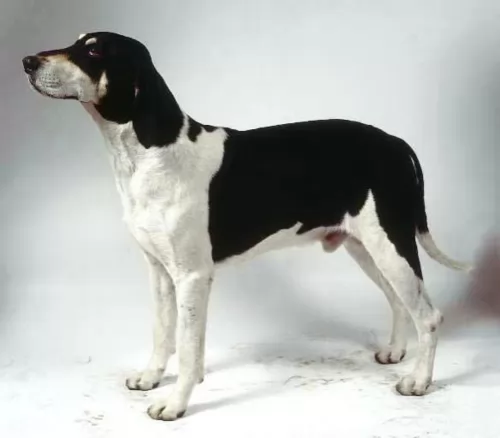 Translated from the French Chien Francais Blanc et Noir, is the French White and Black Hound. His ancestry goes back before the French Revolution to the old Hound of Saintonge and the Gascon Saintongeois. The Francais Blanc et Noir was bred to be a hunting dog and he is a scent hound. They were dogs that went hunting in packs, mostly for Roe and Red deer. In the late 19th Century, the Gascon Saintongeois was crossed with the Poitevin and the result was the Francais Blanc et Noir.
Translated from the French Chien Francais Blanc et Noir, is the French White and Black Hound. His ancestry goes back before the French Revolution to the old Hound of Saintonge and the Gascon Saintongeois. The Francais Blanc et Noir was bred to be a hunting dog and he is a scent hound. They were dogs that went hunting in packs, mostly for Roe and Red deer. In the late 19th Century, the Gascon Saintongeois was crossed with the Poitevin and the result was the Francais Blanc et Noir.
The breed was recognized in 1957 and by 2009 there were about 2000 dogs registered with the Federation Cynoloqique Interenationale. There are three types of the Francais line. They are the Chien Francais Tricolor and Chien Francais Blanc et Orange. The Blanc et Noir was bred as a hunting dog and they remain that especially in France. However, they are also very popular in dog shows. Because so many dogs belonged to hunters who felt no compulsion to register them, they were not recognized internationally for many decades later than they should have been.
Following the Second World War, breeding programs were in chaos and hunters were abandoning dogs that they could not feed. The military killed many dogs also. The Chien Francais Blanc et Noir saw its ranks greatly depleted but the breed survived. After being recognized in 1957 by the CKC and FCI, they gained international attention for the first time. Even though the breed is rare its numbers are greater than either of the other Chien Francais types. The breed registers 200 to 400 new dogs every year.
They are still endangered though because there are very few dogs left outside of France.
The UKC has recognized the breed but the AKC doesn’t.
 It is believed that the Irish Wolfhound is an ancient breed and that it was brought to Ireland as early as 7000 BC.
It is believed that the Irish Wolfhound is an ancient breed and that it was brought to Ireland as early as 7000 BC.
These dogs were bred as hunting dogs as well as guard dogs. There was a time when these huge canines were only allowed to be owned by the nobility. The breed died out somewhat, but Scotsman Captain George Augustus Graham made efforts to restore the breed’s numbers.
Captain Graham devoted his life to making sure the Irish Wolfhound’s numbers were built up, and the breeding program included Great Danes, Borzois, English Mastiffs and Scottish Deerhounds.
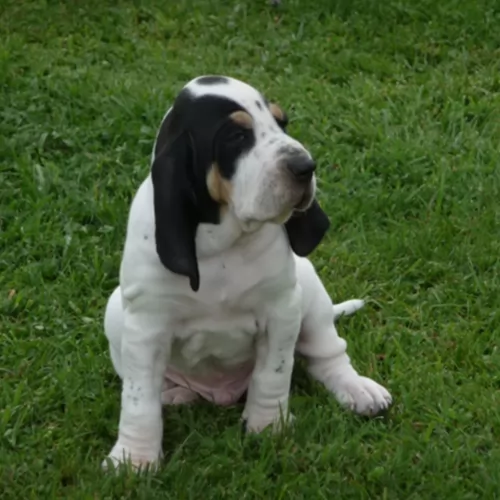 Being a pack hunting dog, the Francais Blanc et Noir is muscular and lean. A long legged athletic breed with long drop ears, a domed head, and flews overhanging the lower lip. The coat is black and white, with black and blue ticking. There are tan dot on the cheeks and above the eyes and also below the tail. These spots of pale tan color can also appear on the dog’s legs. The Francais Blanc et Noir is known for its scenting ability and for its great voice. With its athletic build it is also known for its ability to persevere
Being a pack hunting dog, the Francais Blanc et Noir is muscular and lean. A long legged athletic breed with long drop ears, a domed head, and flews overhanging the lower lip. The coat is black and white, with black and blue ticking. There are tan dot on the cheeks and above the eyes and also below the tail. These spots of pale tan color can also appear on the dog’s legs. The Francais Blanc et Noir is known for its scenting ability and for its great voice. With its athletic build it is also known for its ability to persevere
 The tallest of the sighthounds, the Irish Wolfhound looks like a large Greyhound, only he has a rough, wiry type of coat.
The tallest of the sighthounds, the Irish Wolfhound looks like a large Greyhound, only he has a rough, wiry type of coat.
He is also gracefully built and known as a gentle giant. The double coat which can be fawn, red, white, grey, black or brindle is straight to wavy.
He stands at about 81 to 86cm and weighs roughly 48 to 54kg. This is one of the few dog breeds that you can’t really call social. He loves his own human family, and becomes unhappy and ‘down-in-the-dumps’ when separated from his family members for too long. He is a quiet dog who tends to be somewhat introverted and reserved, while being highly intelligent.
He will require being trained and socialized to make him obedient as he is an independent dog. He takes his role as family protector seriously and even though he is quiet, he is ready to take on anyone who threatens his property.
The Irish Wolfhound is a gentle, quiet, soft-natured, easy-going dog and even though it is such a large dog, it doesn’t throw it’s weight around but is calm and patient around the elderly and children in the home. It can tend to be aggressive with animals he isn’t familiar with.
He is an intelligent dog, but even so he may be quite resistant to training as he is strong-willed and determined to have his own way. These dogs need to be trained and socialized otherwise they just do their own thing.
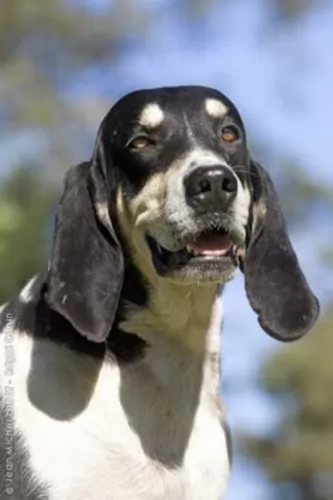 They are good with children as long as the children are not overly rambunctious.
They are good with children as long as the children are not overly rambunctious.
He is a large active dog that would not be adaptable to apartment or city life.
The breed is very smart and easily trainable.
 The most notable aspect of the Irish Wolfhound is his amazing height. The legs are long, the body narrow. He is gentle and easy-going but because he is a sighthound he loves to give chase after animals.
The most notable aspect of the Irish Wolfhound is his amazing height. The legs are long, the body narrow. He is gentle and easy-going but because he is a sighthound he loves to give chase after animals.
He is capable of living in the city or countryside, but your home will need to cater to his size. He isn’t particularly energetic, enjoying a quiet life but he will absolutely need to be exercised.
Provide your gentle giant with everything needed to make him content, and you’ll have a faithful, loving friend for about 10 years.
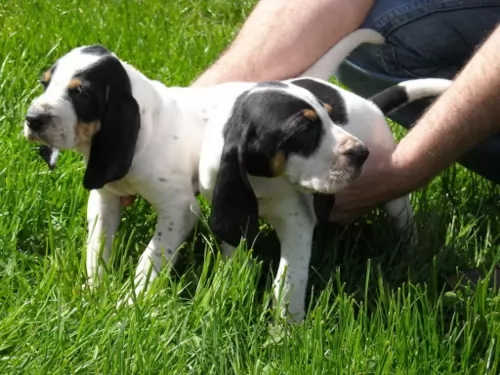 The Francais Blanc et Noir has the propensity for several minor and a few major health problems. These include:
The Francais Blanc et Noir has the propensity for several minor and a few major health problems. These include:
Can lead to death if not treated immediately. Stomach twists and distends.
Can lead to arthritis and lameness if not treated.
These can be avoided if ears are checked and cleaned after each hunt and after exercise.
The breed is susceptible to the non-fatal type. Check for mites regularly.
Both seasonal and food potentially.
 One wonders why breeders seem so bent on breeding such large dogs when they have health issues and they don't live particularly long. Not only do they cost a fortune to feed, but large dogs like this are more prone to illnesses and won’t live as long as small dog breeds. This big dog can live up to 10 years of age or so.
One wonders why breeders seem so bent on breeding such large dogs when they have health issues and they don't live particularly long. Not only do they cost a fortune to feed, but large dogs like this are more prone to illnesses and won’t live as long as small dog breeds. This big dog can live up to 10 years of age or so.
For starters, just because he is a deep chested dog, bloat or gastric torsion can be a threat. Other illnesses to look out for are dilated cardiomyopathy and bone cancer.
This is a disease of the heart muscle where the enlarged heart won’t function properly. The upper- and lower chambers of the heart are enlarged and the heart isn’t able to pump blood out properly. When the heart’s ventricle doesn’t pump enough blood into the lungs, fluid accumulates in the lungs and this ultimately leads to congestive heart failure.
Older dogs battle more with this heart disease and it is also more common in some dog breeds of which the Irish Wolfhound is one. Your dog will have shortness of breath, coughing and abdominal distension. He will need to get to the vet for medical tests.
Bone cancer can strike any dog, but you’ll find in more commonly with larger dog breeds. It can spread quickly and the long term prognosis isn’t good. It’s not easy to pick the disease up and it can mean joint pain for your pet and even lameness.
Your dog will be tired too. Your vet will do X-rays and other tests, but unfortunately the prognosis isn’t usually good. Big-dog breeders should take this into consideration.
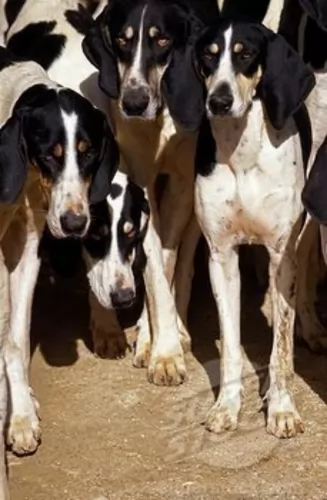 Until a year to 18 months feed two to three times per day two to two and one half cups of high quality dry dog food.
Until a year to 18 months feed two to three times per day two to two and one half cups of high quality dry dog food.
After 18 months of age feed the adult at least twice a day about three to four and one half cups of high quality dry dog food.
The Francais Blanc et Noir is a dog with a lot of energy and bred to be very active. He needs plenty of exercise and both mental and physical stimulation. If you jog take him with you or take him on long walks every day. He will need a large yard and he needs a job if he is not used for hunting. He is good at field trials, tracking exercises, a search and rescue dog and barn hunts.
 This isn’t a particularly energetic dog and he can tend to become lazy. Don’t allow this as becoming unfit and overweight can be very bad for such large dog. Being so large already puts stress on the dog’s body, and the dog is already susceptible to cardiac and skeletal problems. Allowing him to become lazy and overweight will be a death sentence for this large dog. It is imperative to make sure you take him on walks and play games with him.
This isn’t a particularly energetic dog and he can tend to become lazy. Don’t allow this as becoming unfit and overweight can be very bad for such large dog. Being so large already puts stress on the dog’s body, and the dog is already susceptible to cardiac and skeletal problems. Allowing him to become lazy and overweight will be a death sentence for this large dog. It is imperative to make sure you take him on walks and play games with him.
The coat of your dog is thick and medium length and he will require being brushed at least twice a week. You may want to also trim the longer hair you find around his face and legs.
When it comes to his ears, you can moisten some cotton wool and wipe the inside of his ears to remove dirt and excess wax. Remember not to probe too deeply to avoid damaging the ear. If you’re uncertain how to do this, your vet can explain to you how its done.
Check his teeth regularly as dental disease can affect other areas of the body too. Don’t allow his nails to get too long as they can cause paw problems and the nails can hook onto things and cause injury.
Because this is a giant breed, the puppy will grow for a long time. Speak to your vet about how to ensure you feed your puppy in such a way that he doesn’t grow too quickly.
If you feed your dog a commercially manufactured food, make sure its one of the top quality brands. Include home-made cooked food such as chicken, rice and vegetables into his kibble from time to time, and also try to feed him some raw meat occasionally.
Fresh, cool water must be available to your Irish Wolfhound around the clock.